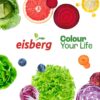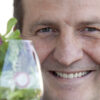From Solar Panels to Vertical Farm
Eisberg Hungary renowned for great working culture and innovation
‘Freshness is an art’ – perhaps this is the slogan that best describes the Hungarian salad producer firm Eisberg’s everyday life, according to its Managing Director, Zoltán Gazsi. “Nature is capricious, presenting our professional raw material suppliers with new and ever-increasing challenges especially during the last years. However, the combination of our strict quality assurance requirements, the modern technology available and our motivated team ensures that we can provide our customers with the crisp, high-quality salads they are used to every day of the year,” he says.
Eisberg Hungary is a firm renowned for great working culture and innovation, one that has maintained its market leader position for almost 30 years. It is part of the Swiss Bell Food Group that also owns the gastro firm Hügli Food and the Zimbo brand in Hungary. Revealing the ‘secret’ of success, the Managing Director points out to Diplomacy&Trade that they really take seriously the basic fundamentals of lean work: respect people – without that, nothing works. “The newly initiated TOPX lean program by Bell speeds up the lean work we started in 2009: continuous improvement day by day, harmonizing the processes to maintain high quality and supply, to get the best out of the raw materials by engaged workers and up-to-date technology.”
The COVID-19 effect
In April 2020, Eisberg Hungary lost close to 30% of its sales volume. “It was a drastic decrease. We managed to weather the crisis okay, we didn’t lay off anybody. We hoped the downturn would end soon, people need good food whatever happens… Except for the gastro part of the business, it turned out to be true. This year, sales boom continues, – even gastro in the countryside –, due to local tourism. Most hotels were fully booked, prices sky high… Budapest is still missing tourism, a lot of restaurants still suffer, those who do well lack waiters and chefs. This situation increases the need for convenience, ready-to-eat products,” Zoltán Gazsi explains.
Although sales run well, the profitability is under strong pressure due to weak HUF, high inflation, strong price increase of many crucial items: raw material, foil, cardboard, manpower, electricity. “We were actually lucky that we just finished a big building extension project before this big wave of building material price increases: the extra 2,000 sqm production surface consist of a new allergen room to handle cheese, meat, fish etc., ingredients of our new salad bowl range produced by our new salad bowl production line,” he adds.
Vertical farm cooperation
Vertical farming is an innovative method that not only eliminates agricultural runoffs, but also creates new employment opportunities in the urban areas. Escalating global population and its concerns for food security in limited arable land will positively drive the vertical farming industry size. Vertical farms exist in the United States and Asia, but not so much in Europe, yet. Global warming is making very big problems, losses for the suppliers, not only the heat itself but also heat combined with very hectic, big changes. So, one day most veggies will be grown protected, not only tomatoes and peppers, as it is now. “I happened to meet the head of Tungsram Innovation, Ferenc Pongrácz and we agreed that Eisberg, as innovative market leader, is the best to test and market their products from the newly opened farm. Firsthand we test microgreens, and the most sensitive items like baby leaves. Workers are wearing hair nets, masks, using fertilized scissors, etc. and a special auditing system is in place to secure the quality, so harvested products are ready to eat. It is expensive still, but we are sure that the higher losses will be in the fields, the more interest will go towards vertical farms,” the Managing Director points out.
Sustainability
Another ‘green’ element at Eisberg is the use of the newly installed solar panels. The whole roof surface of the factory is covered with them and they supply 25-30% of the annual electricity consumption. Zoltán Gazsi highlights that they are constantly searching for solutions on how to make their operations more environmentally friendly. “We have already changed the material of the bowls used to reusable plastic. In most of our products, we no longer enclose plastic forks: we use wooden forks, instead. In the factory, we also initiated many steps to decrease plastic usage. In 2022, we plan to install a water recycling/cleaning unit, which will help to decrease our water use significantly. Those investments clearly show the dedication of the Eisberg Group towards sustainability.”
Helping the helpers
“Our Swiss mother company, Bell Food Group, is a really huge enterprise but it still has many family elements: focus on people, mutual trust, we get freedom at our work. I’m very proud to be personally involved in most CSR initiatives. Just to mention a few from the past ten years, we supported ‘Bátor tábor’ (that helps chronically ill and diabetic children); blind children; diabetic children; birth programs; hospitals; the Edison Platform that support organizations that develop various skills of children to prepare them to cope with the future challenges. We have also bought presents from organizations employing autistic and handicapped children. Salad trading for us is a good ‘tool’ to help those who really need support. We keep high standards not only in quality, but also in values: we do our best to create a valuable community around us,” the Managing Director says.
During the most severe pandemic times, the public benefit organization ‘Etesd!” (‘Feed!’), served 100,000 meals for nurses and doctors in different hospitals. “This organization contacted us that there is a fantastic performance by Hungarian world champion magician Soma Hajnóczy to be attended by 7,000 people. We bought 1,000 tickets and offered them free of charge to families of nurses and doctors at the National Ambulance Service (OMSZ). It was a really popular move and we got so many messages of thanks. Soma also came to our factory in Gyál, just SE of the Budapest, and – assisted by OMSZ spokesman Pál Győrfi – performed special salad tricks in front of the workers,” he says.
“As managing director of Eisberg Hungary, I can tell that our ‘trick’ is that there is no trick.
There is hard and precise work done by a great team, day by day, to sustain our high quality in the mid of constantly changing environment,” Zoltán Gazsi concludes.
Source: Diplomacy&Trade




